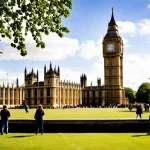Key Innovations Shaping UK Tourism in 2024
The digital transformation within UK tourism trends is accelerating, reshaping how travelers plan and experience their visits. Digital platforms and booking technology now dominate, enabling seamless reservations and personalized itineraries. These innovations significantly reduce friction in the booking process, resulting in higher customer satisfaction.
Simultaneously, the adoption of AI and contactless services is becoming widespread. AI-powered chatbots and recommendation systems assist tourists with real-time information, while contactless payments and check-ins streamline interactions, enhancing safety and speed. This fusion of technology supports businesses in delivering more efficient, customer-centric services.
In parallel : How Will Ecotourism Shape the Future of UK Travel?
Moreover, the rise of virtual and augmented reality experiences is redefining engagement. Tourists can now preview historical sites or access immersive cultural content remotely, broadening the appeal of UK destinations. These advancements not only attract tech-savvy travelers but also enrich visits by providing deeper contextual understanding.
Together, these technological advancements underpin the evolving landscape of UK tourism trends, reflecting an industry committed to innovation and enhanced visitor experiences throughout 2024.
Also to read : How are UK hotels enhancing guest experiences with technology?
Sustainability and Eco-Friendly Travel Initiatives
Sustainable tourism in the UK is experiencing significant growth as travelers increasingly seek eco-friendly travel options. This trend emphasizes minimizing environmental impact while supporting local communities. A key driver is the rising demand for sustainable accommodation, such as eco-lodges and green-certified hotels, which implement energy-saving measures and waste reduction strategies. Likewise, transport options now include electric vehicle rentals and expanded public transit networks that reduce carbon emissions.
Many UK attractions have embraced responsible tourism by adopting eco-certification standards. These certifications ensure businesses meet strict environmental criteria, such as efficient resource use and conservation efforts. Implementing green business practices, including recycling programs and renewable energy use, helps protect natural and cultural sites for future visitors.
Government policies also play a crucial role in promoting sustainable tourism UK-wide. Initiatives incentivize businesses to adopt eco-friendly practices through grants and regulations, while campaigns raise awareness about responsible travel behaviors. Collectively, these efforts support a tourism sector that balances enjoyment with environmental stewardship, ensuring the UK remains a desirable destination for conscientious travelers.
Evolving Visitor Demographics and Preferences
The UK visitor demographics have noticeably shifted post-pandemic, altering travel behavior trends significantly. International travelers are showing renewed interest, but domestic visitors now represent a larger, more engaged segment. This change affects how destinations tailor their offerings and marketing strategies.
A marked increase in Gen Z and millennial travelers brings fresh preferences. These groups seek authentic, immersive experiences rather than traditional sightseeing. Their demand encourages destinations to innovate in accommodations, dining, and activities, emphasizing personalization and sustainability.
Wellness tourism has emerged as a compelling niche. Visitors now prioritize mental and physical health, favoring retreats that combine relaxation with fitness or mindfulness practices. Additionally, rural and nature-based experiences have gained popularity, appealing to those eager to escape urban life and enjoy tranquil environments.
Understanding these travel behavior trends is key to adapting tourism services effectively. Catering to emerging travel segments ensures destinations remain relevant and attractive in a competitive market. Recognizing the needs of younger travelers and the growing wellness-focused audience helps stakeholders align their strategies with evolving visitor expectations.
Impacts of Post-Pandemic Changes on Tourism
The post-pandemic tourism UK landscape has experienced significant shifts driven by Covid-19 effects on travel. One key change is the heightened emphasis on hygiene and health protocols. Tourists increasingly seek destinations and services that prioritize thorough cleaning, mask policies, and contactless interactions. This new norm reflects a broader societal focus on safety and wellbeing.
Health and safety trends have also impacted visitor patterns. For example, crowd management techniques are now common, aiming to prevent overcrowding and ensure social distancing where possible. Many tourist sites have adopted timed entry or reservation systems to regulate visitor flow, enhancing safety without sacrificing experience quality.
Flexible booking and refund policies have become essential in the travel industry. Tourists want peace of mind given the ongoing unpredictability of travel restrictions and health advisories. Providers offering cancellations, rescheduling options, and transparent policies attract more confidence and bookings.
Travel restrictions and health advisories remain influential. Even as some limitations ease, travelers stay alert to changing governmental guidelines and vaccination requirements, which continue to shape destination choices. Understanding these evolving elements is crucial for anyone navigating the post-pandemic travel environment.
Integration of Culture and Local Experiences
The rise of cultural tourism UK reflects a growing appetite for authentic local experiences that connect visitors with Britain’s rich heritage. Travelers increasingly seek not just sightseeing but immersive interactions with communities, traditions, and festivals that reveal the country’s unique character. This shift has encouraged tourism providers to spotlight British heritage travel through vibrant cultural events and historic landmarks.
A key driver behind this trend is the collaboration between tourism businesses and local communities. By engaging residents in crafting experience-driven offerings, visitors gain insights into regional customs and lifestyles. This partnership enriches trips beyond conventional attractions, allowing tourists to attend heritage fairs, artisan workshops, or traditional performances deeply rooted in local identity.
Promotion efforts also emphasize the regional distinctiveness within the UK. From medieval markets in England to Celtic festivals in Wales and Scotland, cultural tourism UK initiatives highlight a diversity of heritage. These events not only attract visitors but empower communities by preserving and celebrating their traditions. Ultimately, this integration fosters a tourism experience that’s both meaningful and sustainable, benefiting travelers and host regions alike.
Regulatory Shifts and Government Interventions
The tourism regulation UK landscape has undergone significant changes, especially following Brexit. New visa regulations now require visitors from certain countries to meet stricter entry requirements. This shift has influenced inbound travel patterns, contributing to adjustments in visitor flow across the UK. Tourists and business visitors alike face modified processes, impacting both short-term visits and longer stays.
Government support has been pivotal in aiding the travel industry’s recovery from recent global disruptions. Strategic policy changes in travel industry sectors include funding initiatives aimed at revitalizing key tourism hubs and sustaining employment. These efforts demonstrate a clear commitment to rebuilding visitor confidence and enhancing competitiveness internationally.
Post-Brexit regulations also promote a more secure environment, balancing national interests with openness to tourism. While some restrictions may deter certain travelers, targeted support and adaptation measures are designed to mitigate negative impacts. Together, these evolving regulations and government support schemes reflect a dynamic approach to ensuring the UK’s tourism sector remains resilient and attractive.
Future Predictions for UK Tourism
The UK tourism predictions for the coming years indicate a dynamic shift driven by evolving traveler preferences and technological progress. Industry experts forecast growth in experiential travel, with visitors seeking authentic cultural and local experiences. This trend is expected to boost regional tourism beyond traditional hotspots, enhancing the overall industry outlook.
One major driver of future travel trends is the integration of digital technologies. Innovations such as augmented reality (AR) and virtual reality (VR) will increasingly enrich visitor experiences, allowing travelers to interact with historical sites and museums in immersive ways. Additionally, smart ticketing and AI-powered personalized recommendations will streamline trip planning and on-the-go decisions, making travel more convenient and tailored.
Sustainability is also set to play a crucial role in shaping the UK tourism landscape. Travelers show growing interest in eco-friendly accommodations, carbon offset initiatives, and low-impact transportation options. Businesses aligning their offerings with these preferences can expect stronger engagement and loyalty, influencing the sector’s long-term growth trajectory. Embracing such digital integration and sustainability efforts together creates a resilient and attractive future for UK tourism.


